
Roberto Calasso
- Italy
- Zu Gast beim ilb: 2013
Roberto Calasso was born in Florence in 1941, studied in Rome and, after receiving his doctorate in English literature, became director of the Adelphi publishing house which, under his aegis, became one of Italy’s most important independent publishers. Calasso has also gained for himself just as impressive a reputation as a writer. His oeuvre is absolutely singular, neither influenced by literary genre not by trends, »turns« or tendencies (it is impossible to declare him a post-Modernist because of his sense of the clumsiness of the modern and just as impossible to declare him right-wing because of the resistance towards him encountered in certain left-wing intellectual circles in Italy).
One of the main features in Calasso’s thinking is that it is always heading for the distance. Not in the sense of fleeing, but rather in the sense of seeking the greatest possible distance to those things that the modern world takes for granted. It suffices to open the cage of the rational mind – and then you come across the figure of Senate President Daniel Paul Schreber, witness of an unsettled cosmology, which has robbed him off his sanity and enlightened him at the same time. Calasso wrote him an epitaph in 1974 in »L’impuro folle« (tr. »The Mysterious Story of Senate President Dr. Daniel Paul Schreber«). In »La rovina di Kasch« (1983; En. »The Ruin of Kasch«, 1994) Calasso fell back on another suspicious figure in his criticism of the modern spirit – Prince Talleyrand. With »Le nozze di Cadmo e Armonia« (1988; En. »The Marriage of Cadmus and Harmony, 1993) the historical distance once again became even greater allowing Calasso to free the (Greek) myth from mythological stereotypes by employing new narrative means. This book was about something that Calasso shares with authors like de Maistre or Cioran: his refusal to accept the dogma that the pathways of the intellect are the pathways of progress. It is not so much explained (Never explain! is one of Calasso’s maxima), but rather demonstrated. Venturing along pathways that lead to Indian mythology (»Ka«, 1996; En. 1998) and to the Vedic ritual of sacrifice as the unfulfilled model not only of a work of art, but of any plot that makes sense (»L’Ardore«, 2010). Three of Calasso’s books have made clear that one can also assume a stance against the modern within the modern itself; in an interpretation of Kafka (»K.«, 2002; En. 2005), in which text and life read as one text; in an interpretation of Tiepolos, which confronts the brightness of his frescoes with the darkness of his etchings (»Il rosa Tiepolo«, 2006; En. »Tiepolo Pink«, 2009), and in his look at the witches’ kitchen of the 19th century, in which painters and poets tested the magic of analogy (»La Folie Baudelaire«, 2008; En. » La Folie Baudelaire«, 2012).
Unlike the great pessimists of a kindred spirit, Calasso does not pronounce judgement on the present. He does not intend to let himself be intimidated: in opposition to a supposedly unstoppable process by which our world is becoming demystified, he holds on tightly to the gods, to the invisible and, above all to the conviction that the violence of a false life is not enough to banish from the world the possibility of the right life.
Die geheime Geschichte des Senatspräsidenten Dr. Daniel Paul Schreber
Suhrkamp
Frankfurt a. M., 1980
[Ü: Reimar Klein]
Die Hochzeit von Kadmos und Harmonia
Insel
Frankfurt a. M., 1993
[Ü: Moshe Kahn]
Die neunundvierzig Stufen
Hanser
München, 2005
[Ü: Joachim Schulte]
Das Rosa Tiepolos
Hanser
München, 2010
[Ü: Reimar Klein]
Der Traum Baudelaires
Hanser
München, 2012
[Ü: Reimar Klein]
